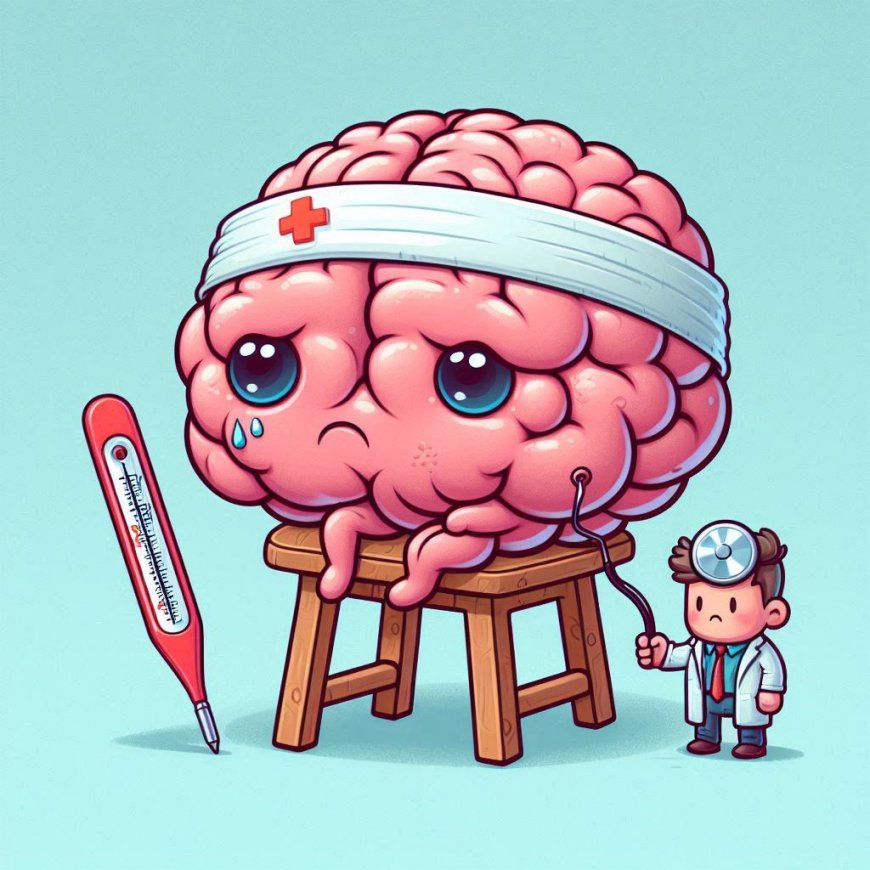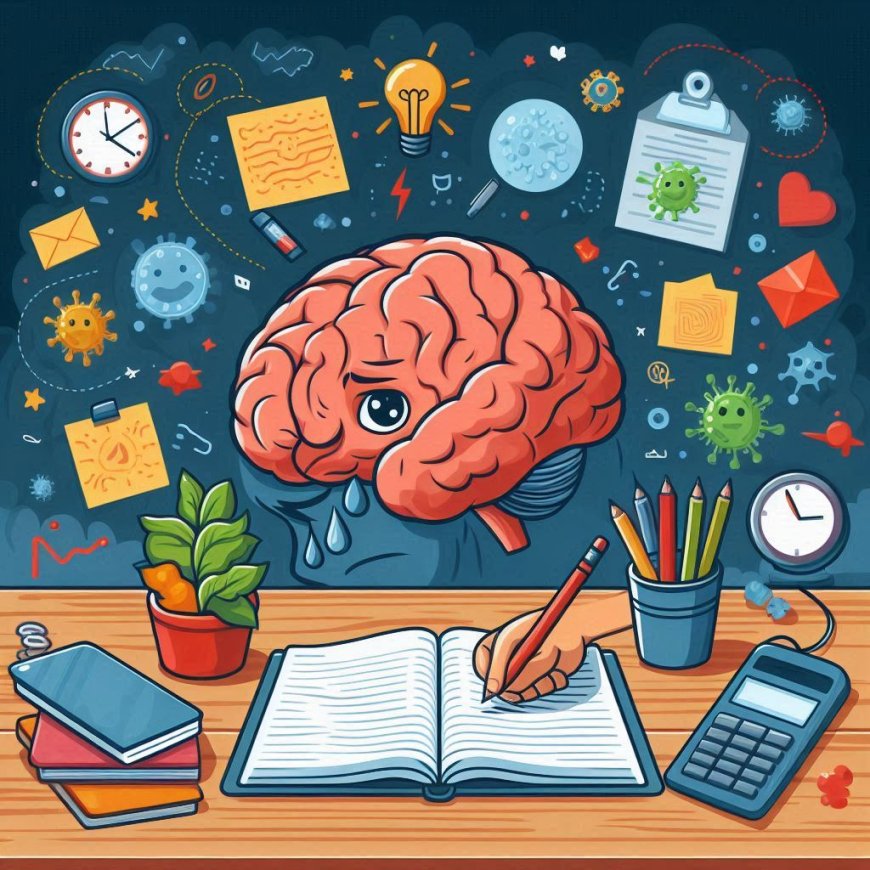10 Signs of an Unhealthy Brain and How to Improve It
Find easy tips to spot and improve brain health, boosting your memory and focus.
Our Brain is the control center of our body which is responsible for everything from our thoughts , emotions to our movements and many other vital functions. Brain can suffer from various issues just like any other organ that may affect its performance. Identifying the warning signs of an unhealthy brain is very much important for maintaining our cognitive health and overall well-being.
Ways to identify Unhealthy Brain

1. Frequent Headaches
Everyone experiences headaches from time to time. There might be many reason for headaches such as dehydration, lack of sleep, stress , and internal problems in the brain. If we find ourselves suffering from headaches more than 10 days a month, it could be a sign that our brain is not receiving enough blood flow and oxygen. Conditions like high or low blood pressure or anemia (low red blood cell count) can contribute to this issue. In this case you should visit a doctor for a checkup.
2. Trouble Sleeping or Waking Up Frequently
If you often wake up in the middle of the night and have trouble falling back asleep, this could be a sign that our brain is struggling to manage stress. High levels of cortisol, a stress hormone, can disturb our sleep cycle / patterns which leads to a shrinking brain. Sometimes food that you eat before sleep can also distrub your sleep. You should stop eating somefoods before going to bed. Over time, this lack of deep sleep can result in brain cell loss, affecting our overall cognitive function. So it is recommended to complete your sleep everyday for better functioning of brain.
3. Persistent Brain Fog
The next sign of an unhealthy brain is difficulty in concentrating and thinking clearly. This can occur due to low blood flow, stress, lack of sleep, or insulin resistance. Consuming too much sugar and refined carbohydrates can lead to this kind of issue which can result to a sluggish brain that struggles to form connections and process information.
4. Sudden Mood Swings
Experiencing sudden shifts in mood. Feeling fine one moment and then anxious or irritable the next, can be a sign that our brain is not functioning properly. This may be due to imbalanced blood sugar levels, which cause our brain cells to starve of fuel and oxygen. Additionally, a leaky blood-brain barrier may allow toxins to enter our brain, making you more sensitive to stress.
5. Depression
Depression is often linked to long-term stress, fear, and anxiety that have become overwhelming. This can throw our brain's chemical balance out of whack, leading to a lack of motivation, fatigue, and feelings of guilt. Inflammation in the brain is also a common factor in depression, making it crucial to address both our mental and physical health.
6. Frequent Dizziness
Feeling dizzy often can indicate poor blood flow to the brain. This issue is more common in individuals with low vitamin B12 levels or low iron levels, leading to enlarged red blood cells that cannot carry oxygen efficiently to the brain.
7. Anxiety
Persistent anxiety, such as constantly worrying about losing things or fearing the unknown, can signal that our brain is locked in a fight-or-flight mode. This is often due to an overactive amygdala, the part of our brain responsible for processing fear and stress.
8. Difficulty Learning
Struggling to learn new information or make connections can be a sign that our brain is not transmitting nerve impulses efficiently. This could be due to a deficiency in acetylcholine, a neurotransmitter essential for learning and memory, or because our brain is not receiving enough energy due to insulin resistance.
9. Restlessness
If you find it hard to sit still and are constantly fidgeting, this could indicate a hormonal imbalance in our brain, such as high cortisol levels or imbalances in dopamine or norepinephrine. This restlessness is also common in individuals with attention deficit disorders (ADD/ADHD).
10. Short-Term Memory Loss
Forgetting things you've recently learned while retaining long-term memories may suggest that our hippocampus, the part of the brain responsible for memory, is shrinking. This can happen when our brain isn't getting enough nutrients, particularly B vitamins, which are crucial for brain health.
How to Improve Brain Health
If you're experiencing any of the signs mentioned above, there are several steps you can take to improve our brain health:
-
Exercise Regularly: Aerobic exercise increases blood flow to the brain, promotes the growth of new brain cells, and helps prevent brain shrinkage.
-
Brain Training: Engage in activities that challenge our brain, such as learning new skills, solving puzzles, or taking courses. This can boost neuroplasticity, helping our brain to form new connections and recover from damage.
-
Eat Brain-Boosting Foods: Incorporate oily fish rich in omega-3 fatty acids, such as salmon and mackerel, into our diet. These nutrients are essential for repairing brain tissue and promoting overall brain health.
-
Get Quality Sleep: Aim for 7-9 hours of sleep per night to allow our brain to repair itself and balance out stress hormones. Sometime stress could lead to overthinking and you can't sleep. You can follow various ways to stop overthinking and get a better sleep at night. If you have trouble sleeping, consider supplements like tryptophan, magnesium, or a sleep blend.
-
Intermittent Fasting: Restrict our eating to a 6-hour window each day, and fast for the remaining hours. This stimulates brain-derived neurotrophic factor (BDNF), which helps grow new brain cells and improves insulin sensitivity.
-
Sunlight Exposure: Spend time outdoors to boost our vitamin D and melatonin levels, which protect against neurodegenerative diseases and reduce inflammation in the brain.
-
Avoid Harmful Oils: Steer clear of foods cooked in vegetable oils like corn oil, canola, and soy, which can oxidize and damage brain cells. Instead, opt for more stable fats like coconut oil or grass-fed butter.
-
Consider Supplements: Certain nootropic supplements, such as Mind Lab Pro, can provide the brain with the nutrients it needs to function optimally. These supplements often contain ingredients like pine bark extract and citicoline, which enhance blood flow and cognitive function.
By recognizing the warning signs of an unhealthy brain and taking proactive steps to address them we can maintain our cognitive health and improve our overall quality of life. If the brain is healthy our life also gets better and we can progress in every aspect of our life. So we recommend you to learn about your brain , Identify problems in your brain , take treatment and do better in your life.
Learn more about : Food to Avoid Before Sleeping at Night and How to Stop Overthinking and Sleep Fast
What's Your Reaction?









































